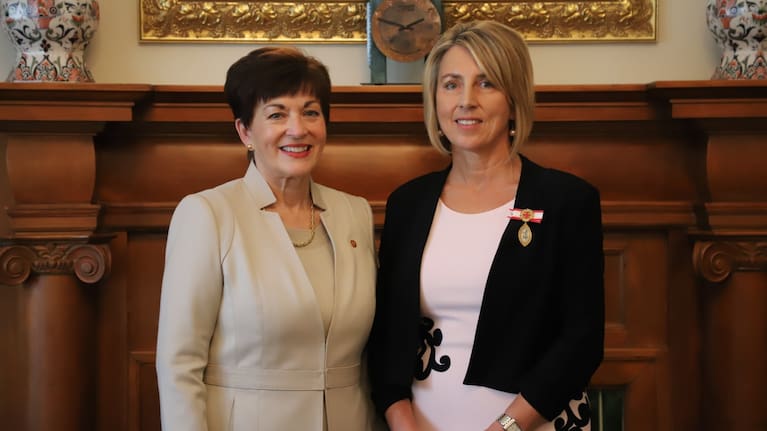A New Zealand nurse working in the only fully operational hospital in Rafah in the southern Gaza strip says there’s been a significant increase in mass casualty events since the United States and Israel-backed food distribution system started in late May.
“The impact of gunshot wounds and explosive injuries is huge and it’s far and it’s wide,” Felicity Gapes told 1News.
“This morning, I took a piece of shrapnel out of a 12-year-old girl’s finger and she was amazing, what a child, so stoic, very stoic,” the International Committee of the Red Cross (ICRC) deputy health coordinator said.
Gapes coordinates health services for the ICRC in Gaza and has been working at the Red Cross Field Hospital in Al-Mawasi since late January.
The hospital in on the frontline and is made up of tents. It was meant to be a temporary facility to support Gaza’s health services but has now become a “major player”, Gapes said, with the bed capacity recently increasing from 60 to 120, due to demand.
“When I say that we are in emergency mode, I mean that… and if you ask me who is affected, it is across the board — men, woman, children, teenagers, older people,” Gapes said.
Before Israel launched airstrikes on Gaza, breaking the ceasefire with Hamas, the hospital was focused on mental health and psychosocial support for patients, physical rehabilitation for amputees, and supporting other hospitals to strengthen their emergency departments.
“We had one stump revision surgery on the 17th of March and then it changed on the 18th of March,” she said.
A mass casualty incident was when the number of patients in need of emergency care at the same time overwhelmed the facility.
Since the hospital opened on May 9, 2024 up to April 30, 2025, staff dealt with 40 mass casualty incidents where 790 people were wounded by weapons.
From May 27, 2025 — when the US-Israel food distribution began — until July 30, there have been 32 mass casualty events and more than 2400 people wounded by weapons.
The morning’s headlines in 90 seconds, including fleeing driver hits house, severe turbulence hits US flight, and massive new bug found in Australia. (Source: 1News)
“The majority of casualties have said they were going for food,” she said.
Gapes said the hospital was struggling with the amount of medical supplies, such as bandages and medicine, required because of the increase in events. Providing food for patients was another source of daily angst, she said.
While Gapes received food through her role, hospital workers who lived in the community were also affected by the lack of food in Gaza. Some staff have fainted during or after mass casualty incidents, due to hunger and the high temperatures.
“When I hear my very close field officer say to me, ‘My son, Adam, I try to feed them two meals a day but the other day I had my hand around the top of his arm and it was bone, it was bone, what can I do?’ and I mean I’ve got no words. I just keep saying, ‘I’ve just got no words’.
“This is what keeps me going, their spirit, wow. No one should ever in their lifetime have to have… we don’t want to talk too much about resilience but my God, no one in their life time should have to have this much resilience,” Gapes said.
The registered nurse was recognised for her work in countries with conflict or political instability in 2019 with the highest international nursing award, the Florence Nightingale Medal.

Gapes has been deployed through Red Cross to the Pacific, Somalia, South Sudan and Myanmar, but nothing has been as mentally and physically challenging as her work in Gaza.
“What keeps me going is when I look at my team and I see them fading before my very eyes and they are still there, they are still doing their job, they are absolutely amazing.”
After being on leave, Gapes said she returned to witness the difference in the bodies of her staff due to a lack of food.
She said patients also weren’t getting the body-healing vitamins and micronutrients in the food they were able to access.
“We need humanitarian aid and humanitarian-aligned aid delivery.”
Gapes said she was drawn to humanitarian work because every role was different.
“I meet the most incredible, incredible people and try to understand a little bit of their culture and try in some countries, very badly, to speak their language and yes, in Arabic, I’m shway-shway [slow] but that’s OK, all good.”
She said her friends and family have been a highly valuable source of support.
Gapes said she would be returning New Zealand in November to recover, with one particular event she was not looking forward to.
“I’ve seen things I can’t unsee,” she said.
“Guy Fawkes is not my favourite night anymore.”









